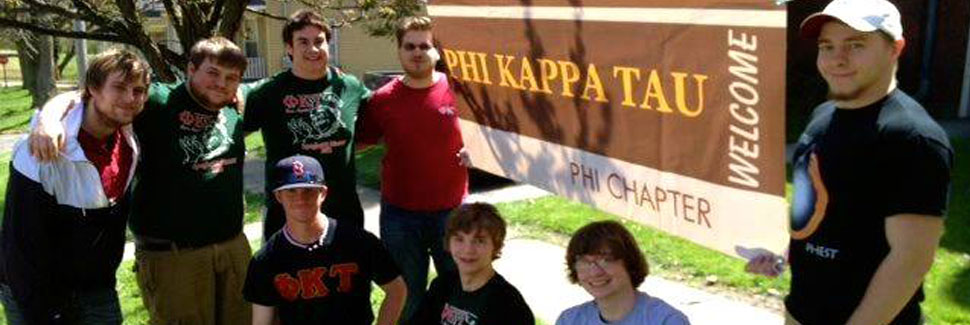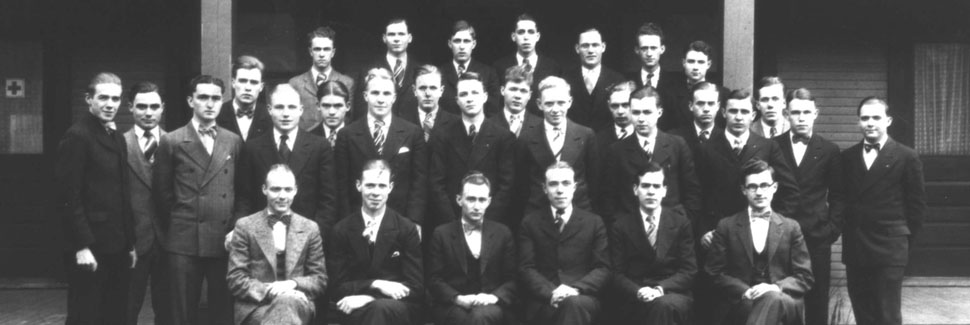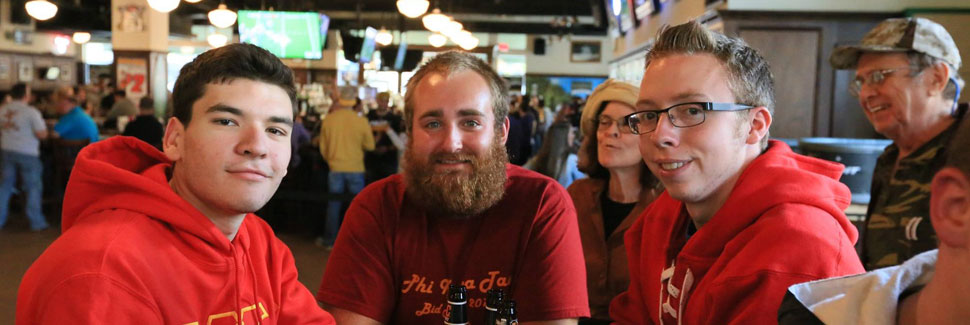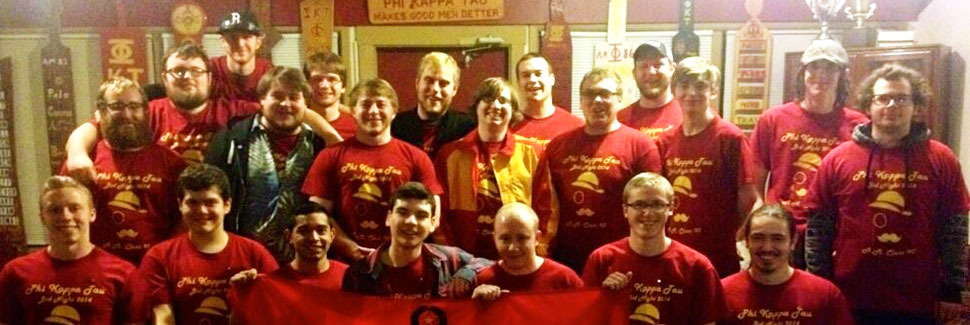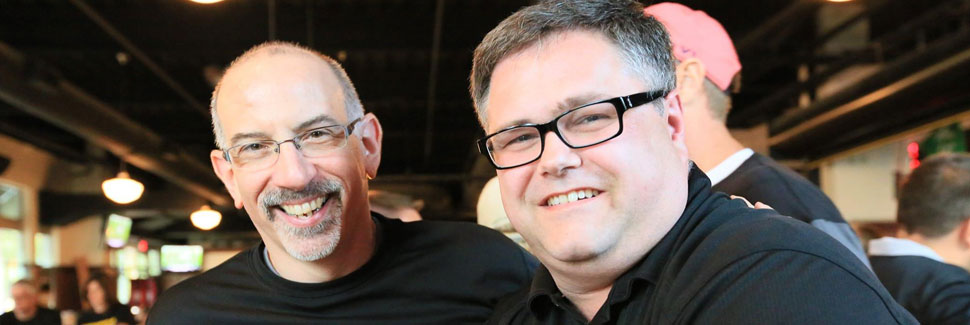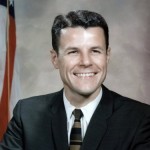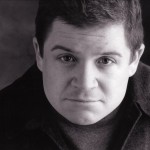History of Phi Kappa Tau
Phi Kappa Tau Fraternity (commonly called Phi Tau) was founded in the Union Literary Society Hall of Miami University’s Old Main Building in Oxford, Ohio on March 17, 1906. The four honored founders were Taylor Albert Borradaile, Clinton Dewitt Boyd, Dwight Ireneus Douglass, and William Henry Shideler.
The fraternity was founded as the Non-Fraternity Association to give Miami’s non-fraternity men a voice in campus political affairs. The name was changed to Phrenocon on March 6, 1909. The two proposed names were the Miami Friends and the Miami Comrades, which were combined to form “Frenocom.” “Phrenocon” was actually an alternate spelling of “Frenocom,” the idea being to make the name sound more Greek.
Phrenocon became “national” in 1911 when an organization of independent men known as the Ohio University Union chose to become the Ohio University chapter of Phrenocon. Additional Phrenocon chapters were established at Ohio State University, Centre College, Mount Union College and the University of Illinois. At Miami, Phrenocon began to have difficulty retaining members by the early 1910s. Often, men would join Phrenocon, then later withdraw their membership and join Greek-letter fraternities. In fact, the Miami chapters of Delta Tau Delta and Sigma Alpha Epsilon were founded by Phrenocon members. For that reason, the Miami Chapter of Phrenocon withdrew from the National Phrenocon and adopted the name Phi Kappa Tau on March 9, 1916. The rest of the chapters agreed to the name change on December 22 of that year and invited Miami to return to the national organization as the Alpha chapter of Phi Kappa Tau. Eta Chapter at Muhlenberg College was the first chapter to charter after the change to Phi Kappa Tau.
Phi Kappa Tau has been a member since 1916 of the North-American Interfraternity Conference(NIC), a consortium of national men’s social fraternities. As of November 2004, there are 89 active chapters and 5 colonies across the United States with approximately 83,000 initiated members.
Phi Tau’s national philanthropy is The Hole in the Wall Camps founded by Phi Tau Brother Paul Newman.
The Phi Kappa Tau Foundation was created in 1945 and is one of the more successful foundations affiliated with a Greek letter organization. The Foundation’s significant expansion began in 1983 with the announcement of a gift of over $1-million from Ewing T. Boles, a member of fraternity’s Delta Chapter at Centre College. The Boles gift was the largest gift to a fraternity or sorority foundation up until that time. That same year Boles was named an Honorary Founder by Phi Kappa Tau. Boles left an additional bequest of over $3-million to the Foundation upon his death. Boles’ example has encouraged countless other gifts to the foundation and its current assets exceed $10-million.
Executive offices of the Phi Kappa Tau Fraternity and Foundation are at 5221 Morning Sun Road in Oxford, Ohio. C. Steven Hartman is the CEO, Charles T. Ball is National President of the Fraternity and Gerald Carlton is President of the Phi Kappa Tau Foundation.
Phi Kappa Tau now has over 85,000 initiated members.
The History of Phi Chapter
***This historical account is a summery of the remarks delivered by Christopher Berry (’86) at the Phi Chapter’s 70th Anniversary Founder’s Ceremony on October 23, 1993. For his complete remarks, click here.
The Rechabites
In the village of Bethany, West Virginia, a men’s dormitory on the west side of Main Street had just been erected in honor of Percy B. Cochran. Philanthropist Earl Oglebay had further shaped the campus by laying the foundation for his famous gates, and central heat via the steam plant had just come to campus.
With only three national fraternities at Bethany, 17 men who desired the fraternal experience formed the Rechabite Club. Their name was derived from a biblical reference to the 35th chapter of the book of Jeremiah and descendants of Recab, a nomad. While the Rechabite Club contained men of good standing, they received little recognition from college authorities. The club did not share in the social privileges that were accorded to the other Greek letter organizations. An even larger problem was the fact that the established fraternities on campus would raid the ranks of the club and recruit some of their best members.
To preserve the organization, the college approved the conversion of the Rechabite club into a local fraternity of the same name. The new organization’s pursuits remained the same: “To provide a college home for certain desirable young men, to afford a medium of fellowship, and to develop moral standing and character.” Pretty lofty goals, even for 1910. They adopted the motto “Manhood Demands Purity”, and that remained the guiding spirit in the twelve years of their existence.
Affiliation With a National Fraternity
The Rechabite Fraternity had continued to grow and felt it was time to take the next step. Along with several other groups on campus, they began the process of affiliation with a national fraternity. The process was interesting in that the club considered and was “courted” by several national groups. Perhaps because of the Ohio Valley connection, 16 men of the local group petitioned for membership in the Phi Kappa Tau Fraternity in the summer of 1923 at the National Convention in Lexington, Kentucky. The request was reviewed and approved by the convention delegation, making Phi Chapter the twenty-first chapter overall, and the first in West Virginia.
The initiations and installations of the chapter’s charter members took place the weekend of October 27, 28. and 29, 1923. The brothers of Phi had to bribe the officials of the town of Bethany a dollar an hour to furnish electricity to the chapter house beyond the standard turn-off time for the festivities. On Friday, the Beta Theta Pi Fraternity entertained the soon-to-be brothers and their dates. Late Friday evening, a “smoker party,” a taboo on campus at the time, raged into the night.
Early Saturday morning, a degree ritual team from the National Headquarters in Oxford, Ohio braved the final seven-mile trek in from Wellsburg on the tracks of the “Toonerville Trolley.” The team included Honored National Founder Dr. William Shideler, who helped initiate our twenty-four founders into the brotherhood.
Later that evening, an installation banquet was held in Phillips Hall, the sisters of Alpha Xi Delta and Kappa Delta graciously serving and serenading the group. Brother J.M. Knappelberd, a National Grand Officer offered words, as did Bethany College President Cloyd Goodnight.
The banquet ended – but the thirst for celebration had not been quenched. Phi Kappa Tau songs were hastily rehearsed and a systematic serenade of all of the sororities on campus commenced. As dawn came to Main Street, one professor noted, “Thank goodness it’s all over, the boys will settle down to work now.”
Two Unknowns
Membership in the late 1930s had withered at one point to two men. These two unknowns also persisted, and with the beginnings of a “Louie’s Lunch” at Professor Green’s house, 1940 saw the initiation of fourteen new members. Somehow, the men of this tough era found a way to get through.
In 1945, a postwar phenomenon known as the G.I. Bill had reshaped Bethany. Intermingled with the traditional student was a new breed of male; a bit older, a bit wiser, tempered by war, and armed with the knowledge of how to raise a little bit of hell.
At the Home of Kirk Woolery
The original Phi Chapter House was abandoned in favor of one in town on Cramblet Street, once the home of Kirk Woolery. The classes of 1948 to 1952 account for almost 100 of our chapter’s alumni, nearly 20 percent of the living Phi Chapter Phi-Taus. Phi Chapter began its long tradition of Greek sing wins as the “Boom-Boom-Boomers” took the 1947 Greek Sing and Swing Competition.
The Phi-Taus of this age could undoubtedly be classified the “jocks” on campus. Most of the intramural awards went to the chapter as Phi Chapter graduated large classes in the years from 1956 to 1966.
In the spring of 1966, another page in our history was turned by the college, as the old chapter house was condemned. Two brothers, refusing to see the writing on the wall – or perhaps trying to save the writing on the wall – stayed to the very end, almost to the wrecking ball.
Home on the Parkinson Hills
In old Phi-Tau style, brothers took up residence on the Old Parkinson Hill in the Barton Campbell Hagerman House. As all things go in cycles, Phi grew from a small but close-knit group to a large close-knit group in these years. At one point in the mid-1970s, the chapter had nearly 60 Resident Council members. New traditions of the Corn Roast and the ever-present Hawaiian Luau became mainstays on the fall campus social scene.
Phi-Tau also moved into a new phase as it was offered “prime position” atop the New Parkinson Hill. The move into our current chapter house took place in 1983.
The Harvard Red and Old Gold Club
In 1985, Don Dallas, a loyal Phi Chapter brother from the 1930s, envisioned and made possible the remarkable organization that has become one of the chapter’s cornerstones; The Harvard Red and Old Gold Club. The model of the Harvard Red and Old Gold Club was soon adopted by the National Phi Kappa Tau Foundation, and was set up for chapters across the country. 22 years later, Don Dallas entered Chapter Eternal on July 5th, 2007.
From Rechabites To Phi Taus
“An in depth look into the evolution from local club to a chapter of national fraternity.”
Phi chapter of Phi Kappa Tau was founded on the Bethany campus on October 27, 1923, thirteen years after its founding club started in 1910. The road to Phi chapter would not have been possible without the establishment of the Rechabite club in 1910.
The Rechabite fraternity originated in 1910 as the Rechabite club, sometime in the late 1910’s, the club took up headquarters in the second floor quarters above Gibson’s General Store on main street. In that same year, the Rechabite leased a house for one year from Edwin w. Gordon of Wellsburg. The house stood directly across main street from the grocery store where the organization’s original head. quarters were. Gibson’s Store has since been razed.
The Rechabite’s new home was the house where Delta Tau Delta was founded in 1858. The decision to lease the Delt founder house was at least partially a political move to persuade the Delt national organization to accent the Rechabite’s petition for chapter status.
Designed to be a place where upstanding young men could be provided with board and lodging at a minimal expense, the Rechabite club established itself early as a solid social organization with high morals. John Cable, its first president, marked the club’s “no drinking and smoking” rule early. If found guilty, members were fined and sometimes expelled for repeated offenses.
The club remained a room and board society for six years. Nobody during those years could forget the help and cooking provided by Momma Richardson.
Under the direction of Rheubie Carfer as president (in 1916), the club drafted its first elaborate constitution. The purpose onto organization was changed from a purely lodging club to a local fraternity styled society. its aims were directed in its constitution, which stated,
”The object of this organization shall be to provide a college home, afford fellowship, and develop the character of its members.”
The Carfer adminstration’s direction for the Rechabite club was serious and business-like. In 1916, a more serious penalty was afforded to those caught using intoxicating liquors or tobacco. According to meeting minutes, those caught were expelled from the club.
Dissatisfied with “mere” club status, the Rechabite voted to turn themselves into a local fraternity in September of 1921 with the apparent intention of being absorbed by some national Greek-letter fraternity. The Rechabite fraternity created its own crest and initiation program to be used formally that year.
The newly formed Rechabite fraternity was housed in the Gibson grocery store until February of 1921, and then moved for one year to the Delta Tau Delta founders house. The reason for the move, records indicate, was to encourage Delt national representatives to accept the Rechabite’s petition to become a Delt chapter. It was in a may 1921, meeting when members of the club voted to petition for admittance (the former Delt chapter was disbanded in 1896). In 1923, the Delts rejected the petition on the grounds that it was not ready to establish another chapter on a small college campus.
In the meantime, the Rechabites started the 1922-23 academic year in their third home located on the corner of Richardson and Church Streets. The historic building was known as bleak house and was where Alexander Campbell’s Millennial Harbinger was published during the with century.
The undaunted Rechabites chose to petition a younger national fraternity. Phi Kappa Tau. At its national convention in August of 1923, in Lexington, Kentucky, 17-year-old Phi Kappa Tau granted the Rechabites their charter making Phi Chapter the twenty-first chapter overall, and the first in West Virginia. Three other charters were granted which created Tau chapter at the University of Michigan, Upsilon chapter at Nebraska Wesleyan, and Chi chapter at North Carolina State University.
Phi chapter was inaugurated October 27, 1923, with the help of William H. Shideler, and bleak house became Bethany’s first Phi Tau house.
The official ceremony was conducted by Phi Tau founder William H. Shiedler on October 27, 1923. The five Phi founders were Carl Francis, Frank Donaldson, W.H. McKinney, William Turnbill, and Albert Wilson. twenty-one other, a mixture of current brothers and alumni, signed the charter to seal the decision.
The Six Houses of Phi
One: The first house, where Phi Chapter was founded was called Bleak House, located on the corner of Richardson and Church Streets. This was where Alexander Campbell’s Millennial Harbinger was published during the Nineteenth Century.
Two: Bleak House was damaged by fire in early 1937 and was deemed unsafe for inhabitation until repairs could be made. The chapter spent a couple years in a house at the south end of Cramblet Street. That house has since been razed and McLean and McEacheran stood in approximately the same place.
Three: In 1939, Phi Chapter purchased the home of the late W.K. Woolery on Cramblet Street. The third Phi-Tau house stood next to what was then the Beta Theta Pi house. The chapter lived in that house until 1964.
Four: In the early 1960’s, the Phi-Taus had been considering buying a larger chapter house. Instead, they rented the house on Roosevelt Ave, vacated by the Kappa Alphas in 1964, and spent two years there.
Five: In 1966, Phi-Tau opted not to purchase its own house and to move into one of the five brand new residence halls built by the college on Old Parkinson Hill. The chapter chose Hagerman House and lived there until 1983.
Six: The new Resident Council of Phi Chapter voted to give up its home in Haggerman House on Old Parkinson Hill of nearly seventeen years and move into a building on Bethany’s New Parkinson Hill known as Overflow. This new house, where Phi Chapter is located today, is flanked by all three of Bethany’s sororities (Alpha Xi Delta, Phi Mu, and Zeta Tau Alpha) and two of its fraternities (Alpha Sigma Phi and Delta Tau Delta).
Notable Phi Tau Alumni
The Creed of Phi Kappa Tau
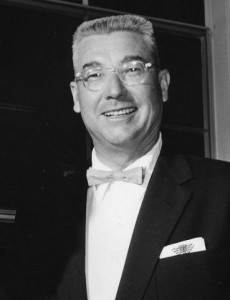 Phi Kappa Tau, by admitting me to membership, has conferred upon me a mark of distinction in which I take just pride. I believe in the spirit of brotherhood for which it stands. I shall strive to attain its ideals, and by so doing to bring to it honor and credit. I shall be loyal to my college and my chapter and shall keep strong my ties to them that I may ever retain the spirit of youth. I shall be a good and loyal citizen. I shall try always to discharge the obligation to others which arises from the fact that I am a fraternity man.
Phi Kappa Tau, by admitting me to membership, has conferred upon me a mark of distinction in which I take just pride. I believe in the spirit of brotherhood for which it stands. I shall strive to attain its ideals, and by so doing to bring to it honor and credit. I shall be loyal to my college and my chapter and shall keep strong my ties to them that I may ever retain the spirit of youth. I shall be a good and loyal citizen. I shall try always to discharge the obligation to others which arises from the fact that I am a fraternity man.
Roland Maxwell,
USC ’22 November 19, 1950


